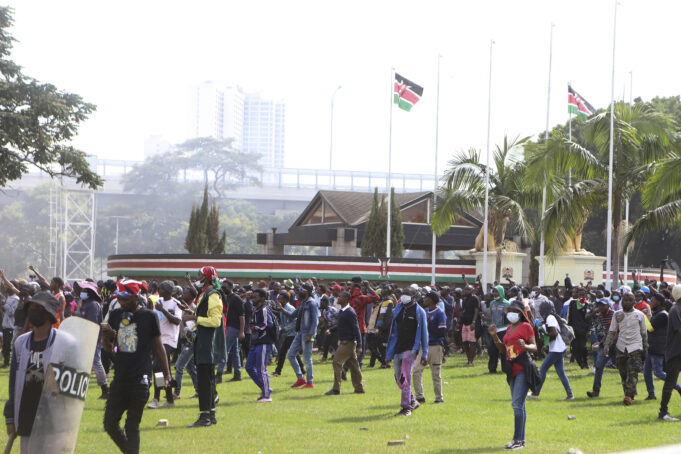Thousands poured into the streets in Kenya for a second time in less than a week as the country’s majority youth population engaged in peaceful demonstrations to protest a government bill to hike taxes.
Media outlets reported that live gunfire and tear gas was being used by police in the capital city Nairobi and Kisumu—the country’s third largest city—as protesters reportedly “stormed the Parliament compound.” At presstime, at least 22 deaths had been reported.

In addition, businesses were looted as demonstrations turned ugly and government officials said they would send in the military to regain control.
This second demonstration was in response to an amended tax bill. This all began with a reaction to a government proposal to raise taxes. Angry youth-led demonstrations then erupted on the streets of Kenya.
“Facing escalating living costs, Gen Z and Millennial Kenyans took their angst to the streets against new finance bill that proposed ‘a slew of additional taxes,’” reported Nita Bhalla, East Africa correspondent for the Thomson Reuters Foundation.
According to the eastafrican.co.ke, Kenyan President William Ruto’s administration is faced with increasing countrywide protests over “the contentious taxation measures for the 2024/2025 fiscal year, even as a last-minute attempt by the ruling coalition to make a few concessions failed to calm an agitated public demanding an overhaul of the Finance Bill 2024.”
Provisions in the original bill that set off demonstrations included the imposed 16 percent tax on bread, tax hikes on mobile money transfers and a new annual 2.5 percent tax on cars.
In addition, according to contextnews.com, the original bill proposed an eco-tax on products considered harmful to the environment—such as packaging, plastics and tires—and would increase the cost of items including sanitary napkins, computers and mobile phones. Other taxes included a 16 percent value-added tax on financial services and foreign exchange transactions.
After protests started in June, Parliament announced emergency amendments. During a news conference, Kuria Kimani, chairperson of the finance committee, announced that lawmakers “would roll back the taxes on bread, oil, motor vehicles and financial transactions, including mobile money payments,” reported aljazeer.com.
“A proposed ‘Eco Levy’ on plastic goods like diapers, sanitary towels and phones would only apply to imported goods, and not local manufacturers,” Kimani said. Medical and housing insurance levies for salary earners were also reduced.
However, protesters felt this was not enough. Not that they didn’t feel that they shouldn’t be taxed, but the conditions under which they live never improve. The demonstrations continued despite the arrests of more than 200 people on June 18. According to Al Jazeera reports, many protesters said they wanted the entire bill dropped.
The Kenyan peoples’ angst stems from the austerity program forced on the country by the International Monetary Fund (IMF).
“People are dying from hunger, children are not going to school,” David Ngooma, a resident from Kibera, Kenya’s biggest slum, told jacobin.com. “We don’t see any help from the government.” On top of that, according to Ngooma, the president is taxing the poorest Kenyans too much.
“This pain is a direct result of IMF policy recommendations that have been forced on the country—repeating recommendations that were implemented with disastrous results in the 1990s,” wrote journalist Nicholas Ford, a video producer and documentary filmmaker. Ford is currently in Africa making a documentary about the IMF.
The IMF has announced a new policy titled: “Social Policy Floors,” which OXFAM—a group that focuses on global poverty and injustice—labeled as a “fig leaf for austerity.” In its analysis, OXFAM discovered that “for every $1 the IMF encouraged a set of poor countries to spend on public goods, it has told them to cut four times more through austerity measures.”
“The same is true in Kenya, where the IMF has encouraged the Ruto government to make massive cuts in health and education. ‘The IMF insisted on the government to reduce spending on education,’ says Njoki Njehu, the Fight Inequality Pan Africa coordinator.
‘We saw in public universities the cost of tuition went up by three times, that was a direct correlation with IMF policies. Their impact has been detrimental,’” Ford wrote.
Ruto, “the new darling” of President Joe Biden’s administration, recently received from the U.S. “Major Non-NATO ally” status and was also encouraged by the IMF to enact extremely regressive tax policies, which typically place the tax burden on the country’s poorest citizens.
Follow @JehronMuhammad on X,
formerly Twitter













